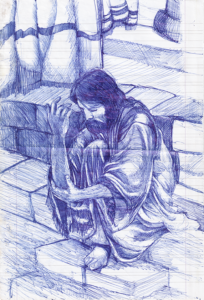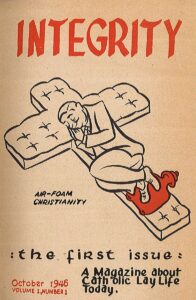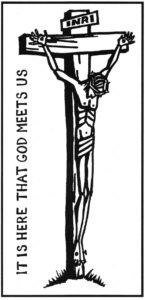“Good and evil are not, after all, two equal and opposing forces” (Sergei Bulgakov)
Someone recently asked us if we were going to write about politicians, oligarchs, and technology czars, about their speeches and policies that hurt many. Hundreds of people, however, are already writing about that. We are trying to look more deeply at a spiritual response.
There is a crisis. It is not only in the United States. It is such a crisis that the Pontifical Academy for Life is meeting in Rome as we write, with the theme of this year’s annual gathering as “The End of the World? Crises, Responsibilities, Hopes.”
What Can We Do?
As we reflect on how to respond to recent events, upheavals, and tragedies, we wonder what the average person can do. We hope that through prayer and sacrifice, along with creative action, we may find a way forward in difficult times.
The traditional Catholic phrase, “Offer it up” is relevant. But what does this concept of sacrifice really mean? Can joining our suffering to the Cross have a transformative role in history? How can we be partners with God and put in our grain of sand for good in the cosmic struggle against evil and help with a reconstruction of the social order to save our world?
Reflecting on “offer it up,” Dorothy Day explained that what we can offer is not just our own suffering: “When we suffer, we are told we suffer with Christ. We are ‘completing the sufferings of Christ.’ We suffer his loneliness and fear in the garden when His friends slept. We are bowed down with Him under the weight of not only our own sins but the sins of each other, of the whole world. We are those who are sinned against and those who are sinning. We are identified with Him, one with Him. We are members of his Mystical Body (From Union Square to Rome).
Fr. John J. Hugo, for many years Dorothy Day’s spiritual director, wrote of the Cross and its role in the life of the Christian, referencing Ed Willock’s drawing of an airfoam, comfortable cross:
“Radical Christianity [to the roots] is discovered only at the Cross, but who desires to be crucified? Like Peter and the other apostles—before the coming of the Holy Spirit!—we all tend to prefer a Christianity without the Cross, “airfoam Christianity,” as it was satirized by Ed Willock in an outrageous cartoon showing a contented Catholic—snuggled down on a cross spread with that seductive cushioning. Many attempt a life of vigorous and dedicated action, while failing to realize that such action is authentically Christian and efficacious only when grafted to the Tree of Life on Calvary. “(John J. Hugo, Your Ways Are Not My Ways, Vol. 1 )
“Within the cosmic struggle between good and evil, the Christian, following Christ’s example, is called to unceasing sacrifice, or cross-bearing.” (Bulgakov)
A recent review article by Joshua Heath offers related insights of Eastern Orthodox theologian Sergei Bulgakov from new translations of some of his writings, including several books and fragments that had not been previously published.
Bulgakov writes from the perspective of tragedy in world history, tragedy redeemed by the loving sacrifice of Christ on the Cross. Tragedy nonetheless, redeemed by Love.
Bulgakov contends, with the tradition of offering one’s sufferings, “Within the cosmic struggle between good and evil, the Christian, following Christ’s example, is called to unceasing sacrifice, or cross-bearing.” He is not only writing of us as individuals and of the concept of self-denial. Bulgakov speaks of the sacrifice of the Church itself through “participation in the eternal priesthood of Christ in the liturgy…”
The Supremacy of Love
We need not despair. Love is ultimately stronger than death.
“Good does battle with evil principally through the active offering of sacrifice, or ‘co-dying’ with Christ.” (Bulgakov) “The Cross, as God’s voluntary assumption of death, shows love to be the internal—rather than strictly oppositional—overcoming of evil. Love’s operation is not an external resistance to or overcoming of evil, for good and evil are not, after all, two equal and opposing forces.
Bulgakov adds, mystically, that “… the supremacy of love is affirmed by love’s active transformation of the disintegration caused by evil and suffering into the voluntary return of what is lost as a sacrificial offering.”
“If the Christian life is a life of sacrifice, it is also a life of creativity.”
Bulgakov insists that creativity must accompany sacrifice: “[The liturgy] extends the scope of sacrifice to include the essential, creative, transforming or transmuting activity that is constitutive of life as such.” He actually states: ’Life and creativity are synonyms” and adds that if the Christian life is a life of sacrifice, then it is also a life of creativity.
This is explicit even in Bulgakov’s description of the Cross as “not only passive reception, but an active taking hold, creative self-definition and daring.” So a life of sacrifice is not boring, it is not only suffering, but can make a daring contribution to history.
Bulgakov posits that “History is not empty time just waiting to be filled. Instead, it stands before humanity and thus the Church as a task, the task of created life. Contributing to the Church’s task in history, the relation between creativity and sacrifice becomes yet more mutual, for the ‘responsible, creative intensity’ demanded of a Christian is to be exercised ‘not in their own name, but in the name of the Lord who has sent us into the world.’ “
Our Sacrifice at Casa Juan Diego Is Availability and Creativity
Peter Maurin and Dorothy Day learned much from the French personalism of Emmanuel Mounier.
In his discussions of the Christian vocation of each person, Mounier emphasized creativity and engagement in the world. Mounier, an intellectual, reminded his readers that availability is as important as any theory. “Availability is as essential as loyalty, the test of history as much as intellectual analysis.”
Sacrifice Not Primarily Negative
Mounier emphasized that sacrifice is not primarily a negative act. Rather it is an act of devotion and of adherence. To sacrifice is to offer oneself to another, to commit oneself to another, to be engagé (engaged).
Availability is as demanding as any other sacrifice. Engagement and availability make life unpredictable.
What Does Availability Mean?
Anyone who has ever been a Catholic Worker or worked in the service of the poor knows how demanding availability can be. As we are overwhelmed with the needs and situations of people who come to us at Casa Juan Diego, we know that availability is our sacrifice. One more person at the door (Christ in disguise), one more expressed need of our guests.
In the day-to-day life of each follower of the Nazarene, there are countless practical opportunities to embrace the Cross in being available as a part of our sacrifice. This idea of availability is closely related to Pope Francis’ concept of accompaniment with others in their pilgrimage.
One could take in a migrant family with nowhere to go, one could sit with an ill neighbor or help them with the basic needs of life, one could help a child get enrolled in school. The possibilities are endless.
I think of one practical example of availability and accompaniment that anyone could imitate:
Ed Willock, whose drawing of “air-foam Christianity” was featured on the cover of the first issue of Integrity magazine (and reprinted here) had twelve children. He became very ill after several strokes. Mark Zwick and his mother (before I knew them) were visiting Dorothy Day one day in New York. After visiting for a while, Dorothy asked them if they would be willing to drive four of Ed Willock’s children up to New England to Mary Reed Newland, who would care for the children for a time. Mark and his mother were available, and they drove the children, joyfully.
The Church in World History
In the past couple of years I have been reading some of the volumes on Church history by Henri Daniel-Rops. Those books bring out the creative, sometimes amazing role of the Church and the Saints in history during very difficult times, when all might have seemed hopeless.
Dorothy Day wrote about what we need for our times:
“Péguy said that the race of heroes and the race of saints stand in contradiction, the contradiction of the eternal and the temporal. He was writing of Joan of Arc, and he said that the two races meet in her, which meet nowhere else. We would say they meet also in Gandhi.With the bishops of the United States pointing out that the greatest danger of our age is secularism, it would seem that it is a time when we must beg God to raise up for our time men [and women] in whom saint and hero meet to solve the problems of the day. And not by war!” (The Catholic Worker, January 1953).
Catholic Worker Creativity and the Kingdom of God
The Catholic Worker movement as begun and lived by Peter Maurin and Dorothy Day was one of the very creative responses by lay people in the Church to bring the lived Gospel to the local community at a difficult moment in history, the Great Depression. We hope that Casa Juan Diego may be another.
We also know and with great hope believe that the lives of our readers are also a part of the ongoing creative responses to a difficult time in history, building up the Kingdom of God and caring for God’s people.
Let us be creative in our response to world crises, uniting our sacrifices with Christ on the Cross, and not be like Mr. Business, featured in one of Ed Willock’s jingles:
“Mr. Business went to Mass
He never missed a Sunday.
Mr. Business went to hell
For what he did on Monday.”
Let us continue to try to work creatively, doing the works of mercy that the Lord requires of us – in His name.
References:
Joshua Heath, “Review Essay: The Eternal Sacrifice,” Modern Theology 41:1, January 2025.
Eileen Cantin, Mounier; A Personalist View of History. Paulist Press, 1973.
Pope Francis. Message of the Holy Father to Participants in the General Assembly of the Pontifical Academy for Life. “The End of the World? Crises, Responsibilities, Hopes.”
Susan Gallagher contributed to this article.
Houston Catholic Worker, April-June 2025, Vol. XLV, No. 2.




